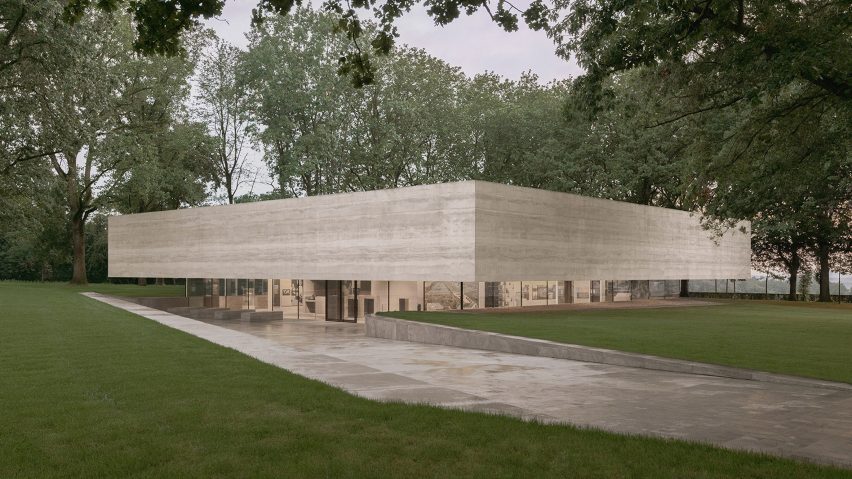Dutch studio Kaan Architecten has added a visitor centre to the Netherlands American Cemetery in Margraten, with a concrete form that references American memorial architecture.
The only American cemetery on Dutch soil, the Netherlands American Cemetery (NEAC) was dedicated in 1960 across a 26.5-hectare site near Maastricht to commemorate soldiers who died in the second world war.
In 2017, Kaan Architecten was commissioned by the American Battle Monuments Commission to add a visitor centre to the landscaped site, providing a small display space and an auditorium.
To respect the cemetery's existing "monumental ensemble" and reference American memorial architecture, the studio created a concrete and glass form that would "claim its own space while blending into the greater whole".
"The United States has a strong tradition when it comes to memorials," Kaan Architecten co-founder Vincent Panhuysen told Dezeen.
"Just look around in DC – one memorial after another," he continued.
"Many wars and struggles for freedom are commemorated, all designed and built in a very solid manner with the intention of preserving these sacrifices for eternity," added Panhuysen.
"All these monuments are significant constructions, carved in stone and cast in concrete, with the purpose of enduring for many generations. This inspiring concept has set the tone for the design of this building for us," he continued.
Located east of the cemetery's central court of honour, a winding pathway framed by trees gently slopes downwards into a concrete patio at the front of the visitor centre. Here, a row of concrete blocks provides seating.
The ground floor of the centre is wrapped entirely by full-height glazing, which is installed with minimal framing to make it "almost invisible".
Above, a facade of layered, poured concrete surrounds the upper story. Supported by the internal concrete walls, this allows a small light gap to be created between the facade and the roof.
"From a distance, the building appears as nothing more than a floating stone above the grass," said Panhuysen. "The museum within and beneath the hollowed-out stone is hardly visible from the outside, while the landscape and cemetery are ever-present from within."
Inside, the wood-lined auditorium and visitor facilities sit at the centre of the space behind poured concrete walls that mirror the appearance of the exterior.
Curved nooks at each corner of the auditorium aim to "enhance the perception of spaciousness" for the display areas, which tell the personal stories of some of those buried in the cemetery.
Led by Kees Kaan, Panhuysen and Dikkie Scipio, Kaan Architecten has offices in Rotterdam, São Paolo and Paris. The studio previously looked to ideas of monumentality in its extension of the Museum Paleis Het Loo in Apeldoorn.
Other recent projects by the studio include the Loenen Pavilion, which offers space to rest and reflect in another Dutch war cemetery.
The photography is by Simon Menges.
Project credits:
Architect: Kaan Architecten
Landscape designer: Karres + Brands landschapsarchitecten B.V., Hilversum
Structural designer and supervisor: Pieters Bouwtechniek, Delft
Civil designer and supervisor: Smits Rinsma, Zutphen
Mechanical and electrical designer and supervisor: HP Engineers, Gent
Building physics supervisor: DGMR, The Hague
Fire safety engineer: DGMR, The Hague
Acoustics advisor: DGMR, The Hague
Building costs advisor: B3 Bouwadviseurs, Wassenaar
Site coordination supervisor: INEX Architecten, Maastricht
Main contractor: Groep Van Roey, Rijkevorsel
Structural engineer: DeClerk & Partners, Waregem
Structural engineer contractor: C T de Boer, Nieuwegein
Mechanical engineer: Deltha, Diepenbeek
Electrical engineer: Maris, Heusden-Zolder
Civil engineer: Dirix, Elsloo

